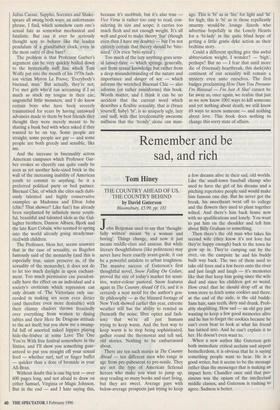Remember and be sad, and rich
Tom Hiney
THE COUNTRY AHEAD OF US, THE COUNTRY BEHIND by David Guterson Bloomsbury, £5.99, pp. 181 John Betjeman used to say that 'thought- fully written' meant 'by a woman and boring'. Things change, and now it just means middle-class and anxious. But while literary thoughtfulness (like politeness) may never have been exactly avant-garde, it can be a powerful antidote to urban toughness. The massive success of Guterson's first thoughtful novel, Snow Falling On Cedars, proved the size of today's market for sensi- tive, water-colour pastoral. Snow features again in The Country Ahead Of Us, and it is certainly a neat motif for the author's gen- tle philosophy — as the blizzard footage of New York showed earlier this year, extreme weather still has the ability to remind us (beneath the noise, fibre optics and fash- ion) that we're all just humans trying to keep warm. And the best way to keep warm is to stop being sophisticated, gather round the thermostat and tell sad, old stories. Nothing to be embarrassed about.
There are ten such stories in The Country Ahead — ten different men who range in age from pre-pubescent to pre-senile. They are not the type of American fictional heroes who make you want to jump up, stop reading so many books and start living, but they are sweet. Average guys with below-average prospects just trying to keep a few dreams alive in their sad, old worlds. Like the small-town baseball champ who used to have the girl of his dreams and a pitching repertoire people said would make him famous one day. But he never got the break, his sweetheart went off to college and the flowers they used to plant together wilted. And there's him back home now with no qualifications and lonely. You want to pat him on the shoulder and tell him about Billy Graham or something.
Then there's the old man who takes his second wife (they know it's not love but they're happy enough) back to the town he grew up in. They're camping out by the river, on the campsite he and his buddy built way back. The two of them used to take old tyres and a few beers onto the river and just laugh and laugh — it's memories like that that keep him going since the wife died and since his children got so weird. How cruel that he should drop off at the town store to fetch some cookies and there, at the end of the aisle, is the old buddy. Sans hair, sans teeth, dirty and drunk. Prob- ably shoplifting. How sad — an old guy just wanting to keep a few good memories alive and he has to forget the cookies because he can't even bear to look at what his friend has turned into. And he can't explain it to her. He doesn't even want to.
When a new author like Guterson gets both immediate critical acclaim and airport bestsellerdom, it is obvious that he is saying something people want to hear. He is a good writer, but it seems to be the message rather than the messenger that is making an impact here. Chandler once said that pes- simism was the opium of the intellectual middle classes, and Guterson is rushing to agree. Sadness is better.


































































 Previous page
Previous page